2019 Toyota Corolla Hatchback First Drive - Doing It Right the Second Time

Toyota’s Corolla iM was an orphan almost from birth. Conceived by Scion, the compact hatchback joined the Toyota clan after its youth-focused parent brand took an eternal dirt nap.
Despite styling that bordered on edgy, the iM failed to elevate drivers’ enthusiasm to a point where its sales numbers played much of a role in the Corolla nameplate’s popularity. Testing revealed a five-door hatch that, while versatile, severely lacked in both power and comfort.
Simply put, it wasn’t very special. At all.
That all changes for 2019, as Toyota’s making amends for its weak earlier effort. With its new Corolla hatch (the iM name disappears, erasing the last trace of Scion from the automotive landscape), the automaker hoped to create a car owners might actually want to toss around — and one they can drive without going nuts finding a proper driving position.
(Full disclosure: Toyota flew me to Del Mar, California to test both this model and the 2019 Avalon. Well balanced, high-fiber meals were served over the duration of the trip, and my hotel room had a view of the ocean. I covered my drinks at the hotel bar. Who knew Bulleit could be so pricey?)
It’s not just the sheetmetal that’s changed for 2019. Beneath the Corolla Hatchback, which wears the Auris name overseas, lies Toyota’s TNGA platform — a stiff piece of architecture that, along with a multi-link rear suspension, improves the car’s strength and handling. Torsional rigidity is up by 60 percent. You’ll find the same architecture under the Corolla sedan come 2020.
Whereas the iM was a sharp-edged wedge, Toyota designers figured a conventional, if sportier, silhouette with a trademark large grille would help lure millennials into the dealer. Headlights resembling axe blades complete the newly menacing front end. As for the rear, creases abound, and Toyota brass were quick to mention the sharply raked liftgate shuns metal for a plastic resin in order to make it happen.
The body’s strong enough to allow a composite hatch, said Corolla product specialist Adam Lovelady. That body, by the way, now boasts a 1.5 inch longer wheelbase, and the new platform sees ground clearance drop half an inch, with a roughly inch wider track, front and rear.
Expect two flavors when the Corolla hatch goes on sale this summer: SE and XSE, both decked out with plenty of standard kit and each containing the same 2.0-liter four-cylinder. Rated at 168 horsepower and 151 lb-ft of torque, the mill provides insurance against the kind of complaints that dogged the iM. (Mainly, that the 137 hp, 126 lb-ft 1.8-liter in that model caused narcolepsy.)
In both SE and uplevel XSE trim, the new Dynamic Force 2.0-liter moves the 3,060-pound hatch with greater gusto than its tepid predecessor. It’s no five-door Supra, but it’s no slouch, either. The engine makes its presence heard, especially in the SE, without coming across as too raucous. Spring for an XSE and the added sound deadening mutes it further.
After learning the engine’s specs, I couldn’t help but think of the base powerplant in the Corolla hatch’s main competitor: the Hyundai Elantra GT. Also a 2.0-liter, the Hyundai’s mill generates 162 hp and 150 lb-ft. A slight edge for the Corolla, but there’s a turbocharged upgrade on offer with the Koreans. The Civic hatch dons a 1.5-liter turbo four of 174 hp and 167 lb-ft (in manual guise).
True, it isn’t in Toyota’s nature to give buyers everything they want, but you can’t say it ignored the cries of purists yearning for a little fun in their commute. Both the SE and XSE come with a choice of transmissions — a “intelligent” six-speed manual and a Dynamic Shift continuously variable automatic with a physical first gear for quicker launches. The iM CVT’s takeoffs are best described as sluggish, so it’s a welcome upgrade.
While the launch gear certainly moves the Corolla off the line with more authority (CVTs also gain a sport mode not found in manual trims), it’s hard to resist the pull of a stick. In general, that is. The Corolla hatch’s six-speed adds rev-matching for drama-free downshifts, though you’ll need to keep your shift speed somewhere between languid and wham-bam to see it in action. A brake hold function keeps the car stationary for uphill launches. It’s a great-looking setup on paper, but I’m sad to report that a light clutch pedal and long throws drained some of the joy from this row-your-own experience.
Toyota claims a wider ratio spread for the CVT, but doesn’t have the figures to back up its promise of improved fuel economy just yet. If you’re in the mood for a finger workout, 10 simulated gear ratios await those willing to work the flappy paddles.
The Corolla hatch proved nimble and well mannered on the less-than-challenging roads of Oceanside and Rancho Santa Fe. Steering is precise, though fairly light for a would-be sporty car. A touch of the “sport” button firms the wheel up nicely.
More power and precision is great, but it adds up to a lost sale if you can’t occupy the car without experiencing physical pain and mental anguish. What’s most impressive about this new model — especially for a writer who described the iM as one of the most uncomfortable cars he’s ever driven — is its vastly improved interior. “Sensuous minimalism,” Toyota calls it, and it’s nothing short of a revelation.
In the iM, finding a comfy seating position was impossible. Not hard — impossible. The ultra soft cushioning meant my butt sank halfway to China, and lower back support was missing like a Malaysian airliner. What’s worse, the door-mounted armrest was so low, you couldn’t rest your elbow on it and maintain a grip on the wheel. The new Corolla gets everything right — you’ll hear not one gripe about front seat comfort from this guy. It’s an improvement over the base Elantra GT, too.
In two-tone guise, the cabin appears classy and airy. There’s no handbrake to clutter up the console in either model, visibility is good, and the materials look and feel appropriate for the car’s class. Infotainment comes via an 8-inch touchscreen mounted high on the dash, and with it comes Apple CarPlay and Amazon Alexa connectivity, plus Entune 3.0 audio.
Few compact cars offer up the kind of rear legroom my 6’4″ frame demands, so I wasn’t shocked to discover cramped quarters when I climbed back there (the below photo shows the driver’s seat in a rearward “Steph” position). Behind those seats lies 18.1 cubic feet of cargo area — roughly seven cubes less than the Elantra GT and Honda Civic hatch. Blame the car’s sportier profile for that.
What’ll a Corolla Hatch set you back? Toyota’s not divulging details until closer to the on-sale date. Still, buyers of SE models aren’t exactly climbing into a bare-bones stripper. 16-inch wheels come standard, as does Toyota Safety Sense 2.0 — a suite of driving aids comprised of lane departure alert with steering assist, forward collision warning, brake assist, and automatic emergency braking. The pre-collision system now recognizes daytime bicyclists as well as pedestrians. Full-speed dynamic radar cruise control comes standard in all Corolla hatch models sold with a CVT, allowing feet-off cruising from 0 to 110 mph. Stick shift models make do with regular dynamic cruise.
There’s also automatic high beams and a lane-keeping system that mimics the preceding vehicle if painted markings disappear.
SE buyers receive single-zone automatic climate control, Smart Key entry with push-button ignition, heated mirrors, LED headlamps, and paddle shifters with 10 simulated gear ratios for the CVT. XSE models enjoy all of these features, plus 18-inch wheels, a grille outlined in chrome, LED fog lamps, leather seating, 7-inch multi-information display (up from 4.2 inches on SE), and adaptive lighting on CVT models.
Unfortunately, manual transmission models eschew blind spot monitoring — a safety feature high on many buyers’ must-have list.
Toyota could have easily eyed the North American car market and said “screw it,” relegating the Auris to the overseas crowd and letting its Corolla sedan do all the work in the compact car space. It deserves kudos for resisting the urge. The new Corolla hatch rights all the wrongs of the old iM, and looks good doing it.
It’s not a perfect execution, but it’s nice to see an automaker put time and effort into a versatile small car that encourages drivers to have a little fun.
[Images: Steph Willems/TTAC]

More by Steph Willems
Latest Car Reviews
Read moreLatest Product Reviews
Read moreRecent Comments
- Jeff Self driving cars are not ready for prime time.
- Lichtronamo Watch as the non-us based automakers shift more production to Mexico in the future.
- 28-Cars-Later " Electrek recently dug around in Tesla’s online parts catalog and found that the windshield costs a whopping $1,900 to replace.To be fair, that’s around what a Mercedes S-Class or Rivian windshield costs, but the Tesla’s glass is unique because of its shape. It’s also worth noting that most insurance plans have glass replacement options that can make the repair a low- or zero-cost issue. "Now I understand why my insurance is so high despite no claims for years and about 7,500 annual miles between three cars.
- AMcA My theory is that that when the Big 3 gave away the store to the UAW in the last contract, there was a side deal in which the UAW promised to go after the non-organized transplant plants. Even the UAW understands that if the wage differential gets too high it's gonna kill the golden goose.
- MKizzy Why else does range matter? Because in the EV advocate's dream scenario of a post-ICE future, the average multi-car household will find itself with more EVs in their garages and driveways than places to plug them in or the capacity to charge then all at once without significant electrical upgrades. Unless each vehicle has enough range to allow for multiple days without plugging in, fighting over charging access in multi-EV households will be right up there with finances for causes of domestic strife.



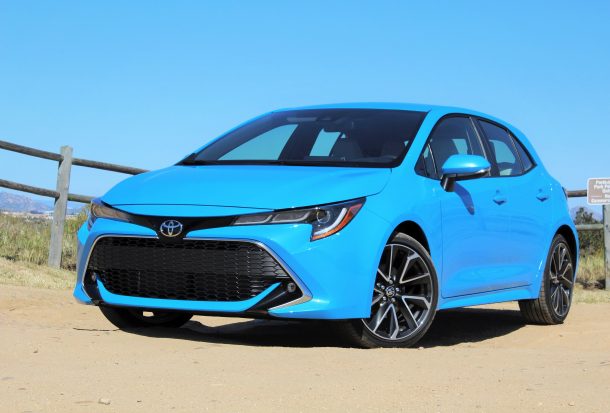


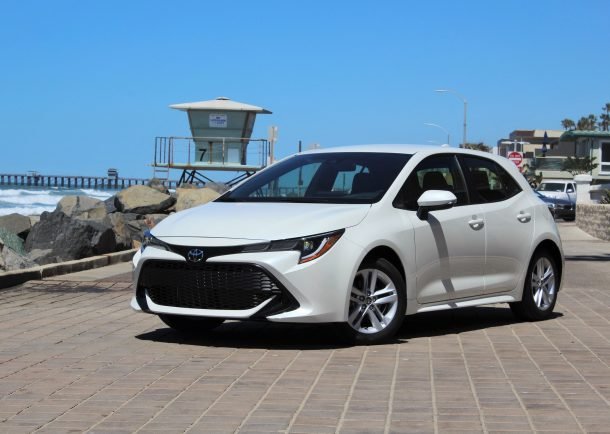




















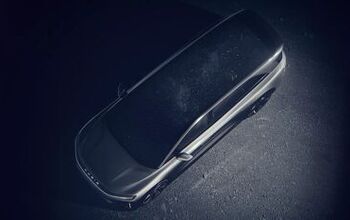


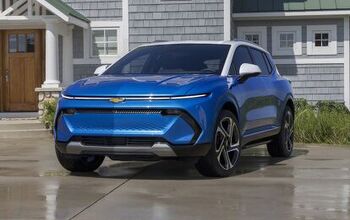

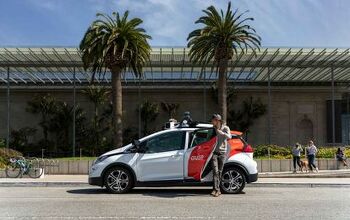







Comments
Join the conversation
That dashboard is a non-starter. Worst implementation of the "iPad velcro'd to the dash" infotainment screen fad that I've seen yet. When is this horrible idea going to die? And why no active cruise control with the 6MT? My Golf R has it, as does our Mazda3. You can even upshift without killing it as you accelerate to your set speed. At least the 6MT is available in the top trim.
KevinC: "When is this horrible idea going to die?" The moment the average human doesn't insist on having his smartphone glued to his face every waking moment of every day. So, never. Cars are infotainment systems with wheels and an engine.